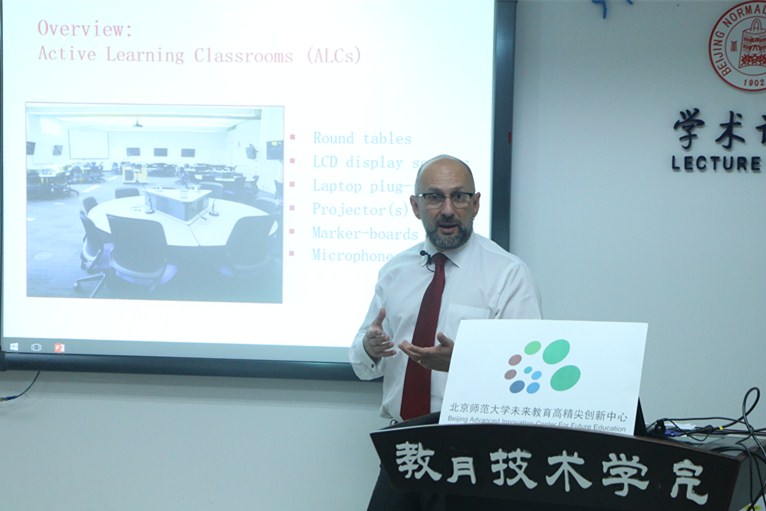Dr. Christopher Brooks Delivered a Lecture on Active Learning Classroom
Dr. Christopher Brooks from EDUCAUSE Center for Analysis and Research delivered a lecture titled Active Learning Classrooms as Catalysts for a Pedagogical Revolution on November 18, 2016 at School of Educational Technology (Yanbo Building), Beijing Normal University (BNU). The lecture was organized by Beijing Advanced Innovation Center for Future Education (AICFE) and it was not only accessible for staff at AICFE, faculty and staff and students at BNU, but also accessible for online audience. Live streaming of the lecture broadcasted on ‘Harmony Education’ platform developed by China Mobile for K-12 education stake holders. Harmony Education platform have been promoted in 31 provinces and had 90 million registered users. This is our first trail and our expectation is to share state-of-the-art research results to K-12 in service teachers to facilitate their professional development.
D. Christopher Brooks, Ph.D., serves as a Senior Research Fellow for the EDUCAUSE Center for Analysis and Research. His lecture focus on Active Learning Classrooms (ALCs), which are technologically-enhanced learning spaces that afford students the opportunity to engage in collaborative learning, serve as a catalyst for fundamentally changing the way higher education thinks about teaching and learning. ALCs have been demonstrated to improve student learning outcomes, to change the manner in which faculty teach in them, to alter the traditional relationships between instructors and students, and to create opportunities for thinking about how we structure curricula, schedule classes, and arrange our approaches to instruction. Although ALCs inspired higher education instructors more than K-12 teachers, they could be used in K-12 as well. ALCs offer:
· cooperative learning environments that encourage student collaboration and peer teaching.
· technology that allows students to easily present work for review by peers and instructors.
· furniture designed to facilitate small-group work.
· the ability for instructors to interactively coach students during activities.
Except the lecture, Dr. Christopher Brooks also participates in Future School 2030 Program, which is a two years program, including call for research proposals, attend seminars, collect cases, write and release a blue paper on future school 2030, and publish peer-reviewed papers.

